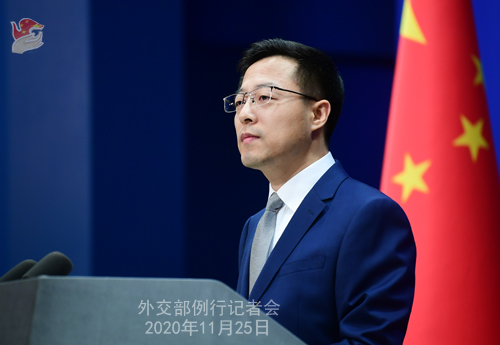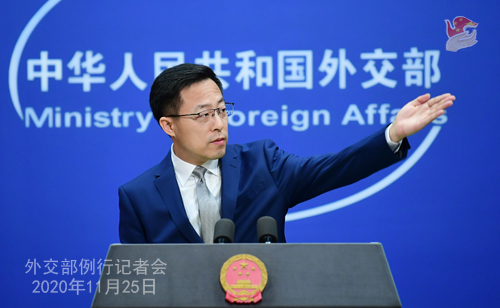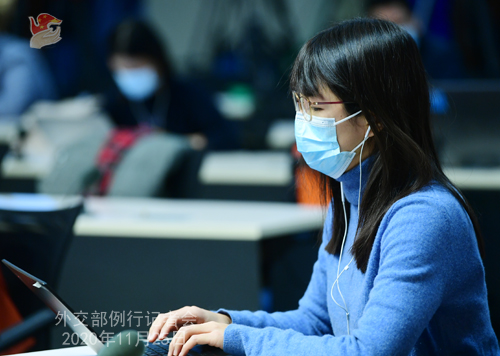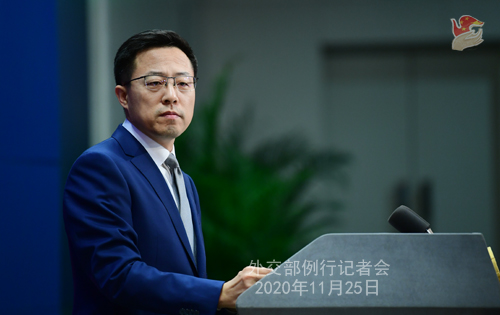| Foreign Ministry Spokesperson Zhao Lijian's Regular Press Conference on November 25, 2020 |
| 2020-11-25 17:30 |
|
CCTV: During his visit to Japan, Chinese State Councilor and Foreign Minister Wang Yi announced together with his Japanese counterpart that the two countries will launch shortly a "fast track" for personnel exchange. Could you give us more details on this? Zhao Lijian: Through friendly consultation, the Chinese government and the Japanese government have reached consensus on establishing a "fast track" to facilitate essential travel including for business purposes on the basis of strict epidemic prevention and control. The two foreign ministers affirmed this yesterday and jointly announced the news. This is a positive step taken by the two countries to promote bilateral personnel exchange and support resumption of work and production amid an ongoing battle against COVID-19. As agreed by the two sides after consultation, the "fast track" will be officially launched on November 30. AFP: The UK will pass a new law today that bans Huawei from its 5G mobile network and telecom companies who continue to use Huawei equipment past the deadline could be heavily fined. What's China's comment? Secondly, India has banned a further 43 Chinese apps on national security grounds. What's your comment? Zhao Lijian: On your first question, without any concrete evidence, the United Kingdom, in collaboration with the United States, has been discriminating and suppressing Chinese companies citing nonexistent "security risks". It blatantly violates the principles of market economy and free trade rules, severely undermines the interests of Chinese companies, and continually erodes mutual trust with China, which is the basis for bilateral cooperation. In light of this, significant concerns have been raised over the openness and fairness of the British market as well as the security of foreign investment in the United Kingdom. On your second question, China expresses serious concerns over India's claim. The spokesperson of the Chinese Embassy in India has issued a statement in response. For four times since June, India has imposed restrictions on smartphone apps with Chinese backgrounds under the pretext of national security. These moves in glaring violation of market principles and WTO rules severely harm the legitimate rights and interests of Chinese companies. China firmly rejects them. The Chinese government always asks Chinese companies to observe international rules and local laws and regulations when doing business overseas. The Indian government has the responsibility to follow market principles and protect the lawful rights and interests of international investors including Chinese companies. China-India economic and trade cooperation, by nature, is mutually beneficial. India should immediately correct its discriminatory approach and avoid causing further damage to bilateral cooperation.
Bloomberg: More than 50 vessels anchored off Chinese ports have been waiting to offload coal from Australia, according to analyses of shipping data conducted by Bloomberg and a relevant firm. Does the ministry have any further information on these ships and why they are not able to offload the coal? We were wondering what is stopping the ships from diverting to other ports? Zhao Lijian: My colleagues and I have taken many questions on related matters. In recent years, China's customs has found many cases where the imported coal didn't meet our environmental protection standards while conducting risk monitoring and analysis over the safety and quality of imported coal. In accordance with relevant laws and regulations, customs officials have strengthened quality, safety and environmental inspections of imported coal to better protect the legitimate rights and interests of Chinese companies and ensure environmental safety. I'll leave the specifics to the competent authority. Yonhap: As State Councilor and Foreign Minister Wang Yi is to visit the ROK, could you share with us the items on the agenda? Zhao Lijian: At present, China-ROK relations are on the track of sustained and steady development. Through this visit, China hopes to work with the ROK to implement the important consensus reached by the leaders of the two countries, deepen high-level strategic communication, strengthen cooperation in fighting COVID-19 and resuming work and production, enhance coordination in international and regional affairs and advance the sound and steady development of bilateral relations. More details about the visit will be released in a timely manner. Please stay tuned. Xinhua News Agency: The fourth China-Arab Media Cooperation Forum was successfully held yesterday. I note that despite the ongoing pandemic, China and Arab states have held frequent exchanges and interactions within the framework of the China-Arab States Cooperation Forum (CASCF). What is your comment? Zhao Lijian: On November 24, the fourth China-Arab Media Cooperation Forum, under the framework of the CASCF, was successfully held via video link. Xu Lin, Director of the Information Office of the State Council, ministers and officials in charge of press affairs of governments of Saudi Arabia, Egypt, Jordan, Bahrain, and Lebanon, and major media representatives attended the forum and held discussions and exchanges under the theme of "media's responsibility in enhancing the common development of China and Arab States against COVID-19". This meeting was an important step to implement the outcomes of the ninth ministerial meeting of the CASCF held in July this year. It fully reflects the firm determination of the news departments of China and Arab States to act from a sense of responsibility, build consensus, use their voices to foster an enabling atmosphere of public opinion for mutually beneficial cooperation, and spread positive energy of fairness, justice, mutual benefit and win-win results. Communication builds bridges and trust is the cornerstone of cooperation. The Media Forum will lay a solid foundation for the next-phase cooperation between the two sides in the press sector and various other fields. At present, the pandemic is still spreading worldwide, but as State Councilor Wang Yi said, "the friendship and cooperation between China and Arab states will not be stopped by COVID-19". Since this year's ministerial meeting, the two sides have successfully held a series of online events, including the second meeting of health experts and experience-sharing session on how China addresses the economic impact of the COVID-19. Tomorrow, the China-Arab Research Center on Reform and Development will also convene an online meeting for experts to discuss "jointly building a community with a shared future for China and Arab States" and "developing a multilateral dialogue platform for the Gulf region". We believe that China-Arab relations, with the strong boost from various CASCF mechanisms, will make greater strides and live up to the shared expectations of the Chinese and Arab people.
NHK: Yesterday State Councilor and Foreign Minister Wang Yi held talks with Japanese Foreign Minister Toshimitsu Motegi and reached some consensus. How does China see this? Zhao Lijian: State Councilor and Foreign Minister Wang Yi is on a visit to Japan as we speak. He will meet with Japanese political leaders this afternoon. Earlier, he held talks with Foreign Minister Motegi, reaching five key consensuses and six deliverables. We already released information on that. This visit is an important face-to-face exchange between the two sides against the COVID-19 pandemic. Under the new circumstances, China stands ready to work with Japan to shoulder responsibilities and promote cooperation with a broader vision and more effective actions in a wider range of fields, to bring more benefits to the two peoples as well as the international community. China Daily: According to media reports, Yemeni Houthi forces fired a missile that struck a Saudi Aramco oil company facility in the city of Jeddah. Does China have any comment? Zhao Lijian: China condemns the attack on Saudi Arabia's oil facility. We stand against all attacks against civilians and civil facilities and call on relevant sides to refrain from taking actions that will escalate regional tensions.
|
| |||||||||||||||
|
|||||||||||||||





